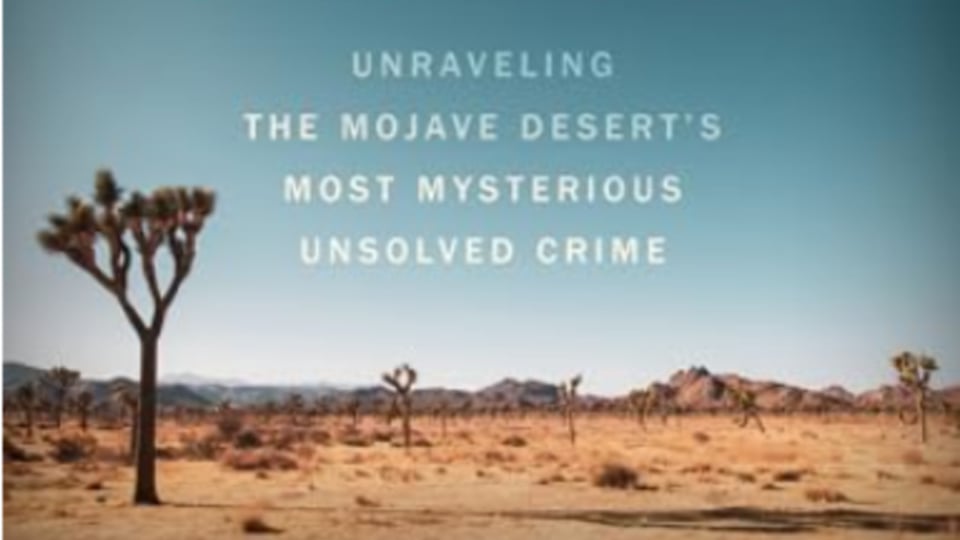The Berman Murders is a well-researched look at journalistic obsession
the true crime that's worth your time

Best Evidence supporters get the full article in their inbox, all others may click through to read.
There's always that guy who brings Kahlúa to the party. "Here you go," he says as he hands the unmistakably-shaped bottle (masked in a brown paper bag, natch) to a stony-faced host. There it will sit for the next 10-15 years, until ants or spring cleaning prompt its disposal. But what if I told you that that drink had an infamous true crime connection? Would you be happier to drink it?
Of course, the answer is "no," because though rum, coffee, and sugar are all yummy on their own, that bottled booze is horrible. And so is the crime related to it, so I should probably get more serious, fast, because this is a book review not a cocktail one.
So here's the deal: 38 years ago, Barry Berman — the heir to the Kahlúa fortune — was killed during a SoCal desert vacation, along with his wife, Louise. Their disappearance and the eventual discovery of their sunbleached bones, pulled loose from the small grave both their bodies had been tossed into, was an early obsession for young Doug Kari, a researcher focused on the same region of the Mojave Desert where the Bermans were found.
As Kari grew older, he turned from conservationism to journalism, presumably because the only thing falling apart faster than the earth is the news business. (Kari didn't say that, but the joke was right there, guys.) Writing as a freelance true crime reporter, he returned again and again to the unsolved double slaying. A connection to Kahlúa, he learned, was the least-weird aspect of the story.
Kari wrote maybe the definitive piece on the Berman slayings for LA Weekly in 2015, establishing as he did a deep bench of research and a solid network of sources. You can see the fruit of that work in his first-ever book, The Berman Murders: Unraveling the Mojave Desert's Most Mysterious Unsolved Crime. You can also see that Kari — perhaps in the vein of writers like Michelle McNamara — was in the story so deeply that his determination to identify a killer felt less like reporting and more like compulsion.
It's bold, I know, to compare an arguably slighter crime to the Golden State Killer, but we don't always choose what worm gets stuck in our brain. (RFK, jr. diss goes here.) But it's fair to lump I'll Be Gone in the Dark and The Berman Murders together for a couple of reasons beyond the authors' singleminded passion for their subjects. Because, like I'll Be Gone In The Dark was at its publication, the Berman Murders are still unsolved — and in both books' cases, the author builds a telling case about who the suspect might be.
Unlike IBGITD, Kari's book is a lightning-fast read. It's a compact 250 or so pages that while heavy on the details never feels overly dense. His time as an alt-weekly writer serves him well here, as he applies those endangered publications' style to his book. There's a mic drop before every break, a grabby hook that keeps even folks whose Apple Watch are telling them to stand up sitting down and turning pages.
What isn't alt-weekly is the narrative's sudden shift from the Mojave to Cambodia, where Kari's prime suspect, a Marine corps captain turned convicted child sex trafficker named Michael Pepe, had moved shortly after the Bermans' deaths. From Phnom Penh, Kari constructs his arguments against Pepe, who was stationed in the Mojave town of Barstow when the couple was killed. It's circumstantial, to be sure, but it's also convincing.
You can tell that Kari has turned the ideas in this book — and especially his case against Pape — over and over in his head like a tumbled stone. What emerges at the end of that tumble is a small, glistening rock of a narrative that satisfies even without the concrete resolution of a confession, arrest, or conviction. But that's what we thought about IBGITD, and two months later, we saw that stunning arrest. Anything is possible!
But even if that doesn't happen here, it's clear that Kari has exorcised this case with this book. He got it all out there, and now we can know everything he does. I found this book deeply interesting, but I'm even more interested in seeing how his next book will read. Now that he's free of the Bermans, the world is his oyster, if he wants it to be.
Add a comment: